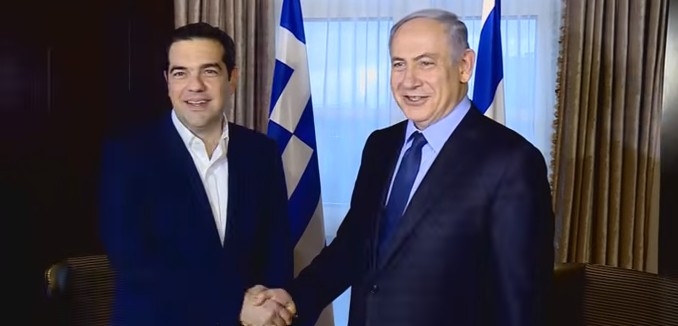Israeli Prime Minister Benjamin Netanyahu met with Greek Prime Minister Alexis Tsipras and Cypriot President Nicos Anastasiades to discuss opportunities to leverage newly discovered gas fields in the eastern Mediterranean Sea with the aim of increasing regional stability and security, the Associated Press reported on Thursday.
“Our states share the same values as well as the conviction that in order to effectively counter multiple challenges confronting us on a local, regional and international level, we must work collectively,” said Anastasiades.
The tripartite summit, which took place in the Cypriot capital Nicosia, centered on the natural gas finds, as well as migration, terrorism, and tourism. The countries also clinched a cooperation agreement on water management.
According to Netanyahu, the leaders agreed to form a committee to discuss the possible construction of a pipeline to transport Israeli and Cypriot natural gas to Europe by way of Greece. The committee will also examine the potential for connecting the countries’ electricity grids via an undersea cable.
The summit took place a day after Netanyahu and Tsipras met in Jerusalem and “signed numerous bilateral agreements in the fields of foreign affairs, economic cooperation, innovation, energy, the environment, tourism, transportation, maritime relations, the maintenance of public order, civil defense and the war on terrorism,” according to The Times of Israel.
“Our cooperation with Greece and Cyprus stands on its own,” said Netanyahu on Wednesday. “While we believe that it should have happened some time ago, we are pleased by the current progress.”
The growing cooperation between Israel, Greece, and Cyprus was “unthinkable” a decade ago, The Jerusalem Post’s diplomatic correspondent Herb Keinon wrote last week. The impetus for the strengthened ties has been the offshore gas reserves that all three countries are interested in developing.
At a time when the European Union’s bureaucracy is increasingly hostile towards Israel, Netanyahu has pursued a strategy of enhancing ties with individual European nations that have common interests with the Jewish state. “In Netanyahu’s view of the world, there is a clear dichotomy: poor relations with multilateral organizations, good relations on a bilateral level with individual countries,” Keinon wrote.
In The EU’s Israel Problem Goes Far Beyond Labels, which was published in the January 2016 issue of The Tower Magazine, Steven J. Rosen exposed how unelected bureaucrats in the EU have been pushing the European body to adopt more hostile policies towards Israel.
Israel’s detractors inside European ministries see Israel’s relationship with the European Union as an opportunity to apply pressure on the Jewish state, rather than a desirable goal in itself. In agencies like the European External Action Service (EEAS—the EU’s foreign ministry) and the European Commission (its executive branch), the officials charged with organizing policy options for the European Council—the heads of government of EU member states—are intensely interested in the Palestinian perspective and highly critical of Israeli policies.
The beliefs of this camp are reinforced by a steady stream of one-sided reports portraying Israel in a negative light. An information pipeline from the Mideast to Brussels is fed by pro-Palestinian advocacy groups operating in the West Bank and Gaza, as well as far-Left Israeli groups allied with them. Many of these NGOs are funded by European governments and foundations, and they work in close consultation with official European envoys in Ramallah and Jerusalem. These envoys integrate the NGOs’ allegations into their own reports and forward them to Brussels and their own capitals. In many cases, the government of Israel does not have the opportunity to vet these one-sided reports.
This camp is led by officials like Christian Berger, the Director for North Africa, Middle East, Arabian Peninsula, Iran, and Iraq in the EEAS. He is also the top Mideast aide to Mogherini, the EU’s foreign affairs chief. His views are supported by like-minded bureaucrats in European foreign ministries.
Another source for such reports is the European Heads of Mission in Jerusalem and Ramallah, nicknamed HoMs. It annually produces a highly critical end-of-year report on Israeli activities in East Jerusalem that it sends directly to the European Union’s Political and Security Committee, which then formulates policy. Typically, these HoMs reports include recommendations for sanctions and other forms of political and economic pressure on Israel. Though meant to be confidential, these reports are routinely leaked to Haaretz, a sympathetic Left-wing Israeli newspaper. Individual European ambassadors also send detailed reports to their foreign ministries and offices in Brussels.
These groups are joined by some former EU and European government officials whose views are given great weight by the Eurocrats. For example, 19 prominent ex-officials, assembled as the European Eminent Persons Group, recently wrote to senior EU officials urging a variety of ways to pressure Israel and support the Palestinians. The group included such luminaries as Javier Solana, the former EU High Representative for Common Foreign and Security Policy; Miguel Moratinos, the former EU Special Representative for the Middle East Peace Process; and Ruprecht Polenz, former Chairman of the Foreign Affairs Committee of the German Bundestag and ex-Secretary General of Chancellor Merkel’s political party, the CDU.
There is also an outside think tank allied to Israel’s critics inside the EU bureaucracy—the European Council for Foreign Relations. It is strongly supported by top J Street donor George Soros. In July 2015, it published a report proposing an array of severe sanctions against Israel, and is marketing that report aggressively.
[Photo: IsraeliPM / YouTube ]




